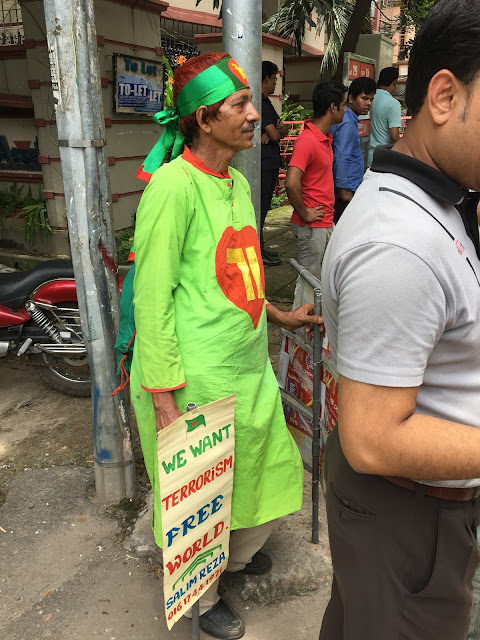Bengali New Year coincided with Good Friday this year.
Bangladesh celebrates the first day of the new year with colorful processions, fairs, songs and dances.
People dress up, even my local food store's staff wore new and beautiful punjabis and sarees.
I attended the festivities last year but due to the security situation, it was recommended to avoid large gatherings.
At home we celebrated Easter by displaying the one and only decoration we have.
Bangladeshis are really creative with decorations. With a few bambus and a couple of thousands lights they make wonders. This is from our street a couple of weeks ago.
For many people, even New Year´s day meant hard work.
The construction site next to our house was in full action. Actually, whole Dhaka is a huge construction site, old buildings are demolished, new are being built day and night with methods that equal Gregorian calendar year 1424, i.e. mainly muscle power, without proper clothing, shoes or equipment.
Sad news from the domestic front.
"Madame, I cannot see anything", our housekeeper S. called one morning about a month ago.
He lost his sight as a consequence of diabetes but he has now been in eye operations and will hopefully recover gradually.
I had noticed that his cleaning was not quite prefect, to put it mildly. His cooking was, however, excellent even if he must have seen very little in the end.
Since we only have a couple of months left in Bangladesh, we decided not to hire a new housekeeper. (Jus in case you wonder: S. was generously compensated by us).
This sounds awful but I had not cooked a single meal since we moved to Dhaka.
The kitchen was S's empire, we took care of the eating. So, if you think that my husband looks a lot thinner, blame my poor cooking.
More from the domestic front.
As a flower lover, I bought a couple of dahlias to our balcony looking forward to the wonderful flowers I had seen everywhere. So far, I have only been fighting against insects eating the flowers during the night and the sun torturing the plants during the day.
Anyway, the mango season is getting closer. These are not from my balcony.



















































